by Ludwig Heinrich Dyck
East of the Rhine the horizon melted away in an unbroken emerald sea upon which, or so the legends told, giants piled up ranges of rugged hills. The pastures and plowed fields, the scattered homesteads and hamlets that marked the hand of man, were tiny islands, all but swallowed up by an unending wilderness of swamps and forests.
Only the raven’s caw, the grunt of a bear, or the bellow of the great aurochs—wild bulls—broke the silence of the primordial forest. A deer in a meadow stomped its hoofs to warn the rest of the herd before they bolted into the safety of the thickets. A handful of tall, flaxen and red-haired men filed into the clearing. Furs or short rectangular cloaks, called sagum, covered the chest and shoulders of their near-naked bodies. The spears and shields they carried marked them as warriors. Everything in their lithe stride, their appearance, and their bearing marked them as much a part of the natural world as the wild beasts with which they shared their domain.
These men were part of the vanguard of 15,000 Germanic Hermunduri, Langobardi, and Semnones. Along with warriors from lesser German and perhaps the odd Celtic or even Slavic tribes, they gathered from their villages to tramp beneath green boughs to the banks of the Rhine. All were part of the mighty tribal confederation known as the Suebi, whose members distinguished themselves by their sideways or stiff backward knotted hair. Their territory stretched east all the way to the Elbe River and along the Rhine to the Danube, exerting pressure on Gaul and the Alpine Helvetii.
Hunting and War: The Life of the Early Germans
The Germans of the first century bc could be compared to the Zulu tribesmen or the Iroquois confederation of the colonial age. In his Gallic War, Caesar wrote that their chief dieties were the Sun, the Moon, and the Fire God. Their whole life consisted of hunting and war. Chastity was held in great esteem. Both sexes bathed in the river wearing little else but small skins of hide or fur. Even in the coldest localities a great part of their bodies were left bare. The chiefs settled disputes among their people and in times of war elected a warlord from the aristocracy.
As in early Celtic society, power and prestige lay with those who could claim victory in raids and battle and boast the largest entourage of personal followers. The land was owned by no one; it was regularly assigned and rotated among the clans with no one abiding in their habitation for more than a year. Vast wildernesses surrounded the tribal lands, kept purposefully clear of human settlement by warfare. Germans traded chiefly to sell their booty, caring little for imports and forbidding that of wine, thinking that it made them weak and womanish. Caesar added that the Germans knew little of agriculture and that their main foods were milk, cheese, and meat. Archeology has revealed a slightly different picture, one of widespread, albeit primitive, agriculture and a diet dominated by barley and wheat, with meat relatively rare.
Representatives of the Suebi chiefdoms met once a year in a sacred grove of the Semnones. The Suebi may well have decided whether to aid the powerful Gallic Arverni and their allies the Sequani there. The Arverni had petitioned the Suebi to attack their old enemies in central Gaul, the Aedui of modern Burgundy.
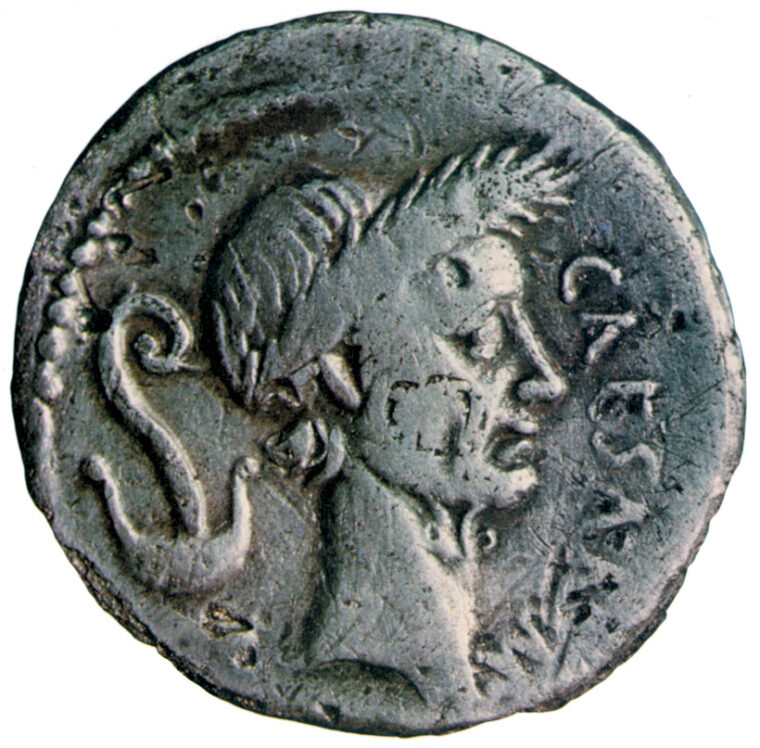
The Suebi needed little convincing. Germania was poor and primitive. West of the Rhine however, the forest fragmented into the rich and relatively densely settled Gallic countryside. Although Gallic and Germanic tribes dwelled on both sides of the river, it served as a rough border between Germania and Gaul. The latter realm burgeoned with potential loot, the acquisition of which would bring martial glory to the Suebi warrior.
In 71 bc, the Suebi army crossed the fabled waters of the Rhine to strike into Aedui territory via the lands of ostensible Suebi allies, the Sequani. When word spread back to their homelands of the bountiful life in Gaul, more Suebi decided to trek westward. Between 70 and 65 bc, 120,000 German warriors, women, and children settled among the Sequani and continued to assault the Aedui.
The German and Gallic rank and file had no more than a shield for protection. The Germans were iron-poor, however, and the Gallic swordsmen’s yard-long blades were superior to the bone or fire-hardened, wood-tipped spear wielded by the more savage of the German warriors. The Germans enjoyed a fearsome reputation and though the population of Gaul was more than six times larger than the estimated three million souls of Germania, the Suebi confederation was large enough to give them a numerical advantage over the Aedui. Although the Aedui summoned their satellite tribes to their aid, they suffered nothing but defeats at the hands of the Germans. All the Aedui nobles, councilors, and knights were killed and their power in Gaul shattered.
The Dynamic King Ariovistus
The Arverni had achieved their goal of crushing their Aedui enemies, but at an unexpected price. The Suebi proved to be no dogs to fight and heel at their master’s call, but rather wolves, which would do and take as they pleased. Thus, the new power in Gaul was not the Arverni but the Suebi under their dynamic king Ariovistus. A man born before his time, he was carved out of the same wood as the Germanic warlords who centuries hence would claim the withering West Roman Empire for their own. Ariovistus seized a third of the land from the erstwhile allied Sequani, reckoned among the best in Gaul. From his new domain, he demanded and received distinguished Gallic hostages.
The Gauls, however, were not about to take the Germanic incursion without a fight. All of central Gaul united against the Suebi at the legendary Battle of Magetobria in 61 bc. It was the Germans who were now likely outnumbered, but the result was the same. Ariovistus smartly remained on the defensive within his camp flanked by marshes. When the investing Gauls fractured into scattered groups due to supply shortages, Ariovistus sallied forth and crushed them. No doubt there was much celebration among Ariovistus’s warriors. At banquets, his champions drank from prized auroch horns inlaid with silver and hailed their victory!
Before striking into Gaul, Ariovistus had allied himself to Voccio, king of the Celtic Alpine realm of Noricum, by marrying Voccio’s sister. Now undisputed master of central Gaul, Ariovistus further consolidated his position by being proclaimed a “friend of Rome” in 59 bc by Metellus Celer, the proconsul of Gallia Narbonensis (the Roman province of southern Gaul) and by the rising Roman politician, Consul Julius Caesar.
Caesar’s prestigious family claimed descent from the founder of Alba Longa, one of the earliest and legendary settlements of the Tiber valley. His aunt was the wife of Marius, co-founder of the legion cohort tactics, conqueror of the Germanic Cimbri and Teutones, of Jugurtha of Numidia, and a major player in the civil wars of the early first century bc. Surviving prosecution by anti-Marian factions, Caesar rapidly climbed the Roman political ladder. He served as Questor (financial magistrate), Aedile (temple, street, and grain supply administrator), Pontifex Maximus (chief priest of Rome), and Preator (justice magistrate) before attaining the Consulship in 59 bc at 41 years of age.
Caesar also masterminded the powerful first Triumvirate between himself, the wealthy Marcus Licinius Crassus, and the brilliant general Gnaeus Pompeius Magnus. Caesar proved that he could excel on the battlefield as well as he did in the political arena when he put an end to the Helvetii intrusion into Gaul in 58 bc.
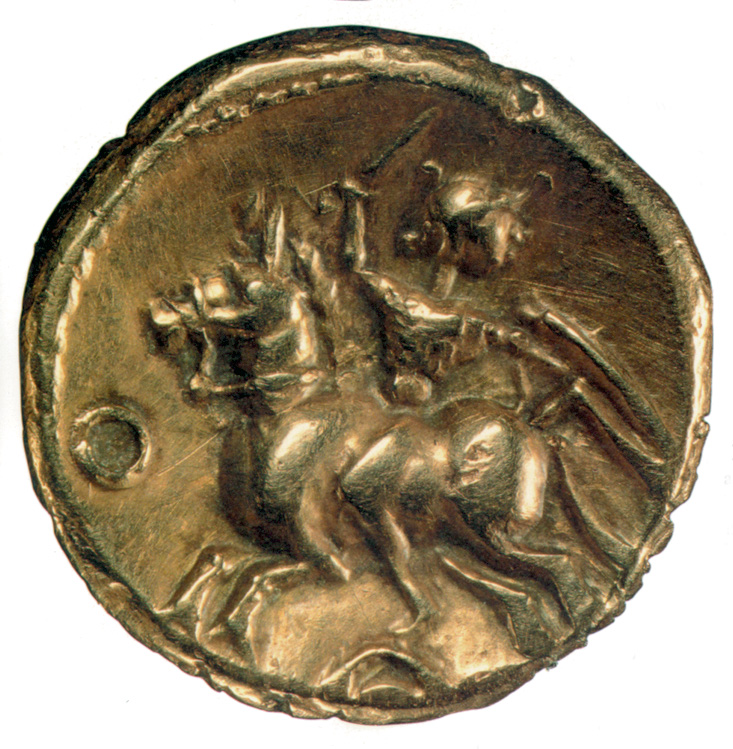
Only Caesar and the Roman Army Could Save Gaul…
Caesar’s victory tremendously increased his prestige among the Gauls. If he had defeated the feared Helvetii then perchance could he not also deliver them from the greater menace of Ariovistus’s Germans? A delegation of notable chiefs appeared before Caesar, led by none other than Diviciacus, the Chief Druid. Diviciacus told Caesar how Ariovistus’s Suebi had come to hold sway over the Gauls. Ariovistus was a cruel tyrant, “ill-tempered, headstrong and savage,” who demanded noble children as hostages and inflicted torture upon whomever did not instantly comply with his wishes. To make matters worse, Ariovistus was now demanding that the Sequani evacuate another third of their land to make room for 24,000 Germanic Harudes who had joined Ariovistus a few months previous. Soon all of Gaul would be under the dominion of the tyrannical Germans. Only Caesar and the Roman army could save Gaul from Ariovistus. Agitated and fearful, Diviciacus continued that by no means should Caesar speak of this meeting to Ariovistus, lest he put to death all the Gallic hostages in his keeping.
Caesar noticed that there were Sequani envoys amongst the Gallic chiefs, but that they had not spoken a word, having “hung their heads with dejection with their eyes fixed on the ground.” When he inquired as to their silence, Diviciacus replied that their fear of Ariovistus and his possible retributions on their lands was so great that they dared not even speak against him in secret.
To calm the Gauls, Caesar promised that he would confer with Ariovistus and put a stop to the German king’s outrages. The matter put Caesar in a bit of a bind since he was co-author of the senatorial decree that recognized Ariovistus as a friend of the Roman people. However, now that Caesar’s victory over the Helvetii opened the door to Roman expansion in Gaul, he saw Ariovistus in a different light. Caesar sent deputies to Ariovistus to arrange some station on neutral ground for a parley.
Ariovistus’s envoys replied that Caesar should come to him. Furthermore, they reminded Caesar that Ariovistus had not ventured out of his homelands as a conqueror but was invited by the Gauls. He had beaten every army the Gauls sent against him and now it was his right as a conqueror to rule as he pleased—the Romans of all people should know this! And what business were his conquests to the Romans, whom he considered his friends? Caesar answered that the Aedui were the friends of the Romans and that if Ariovistus wished to remain the same he would restore all hostages to the Gauls and refrain from bringing any more reinforcements across the Rhine.
“What German Valor is Capable of”
Ariovistus replied that he would refrain from attacking the Aedui and their allies if they paid their tribute. If not, the title of “brothers of the Roman people” would not save them. He continued by saying, “I am not impressed by Caesar’s threat to punish my ‘oppression’ … No one has ever fought me without bringing destruction upon himself. Let him attack whenever he pleases. He will discover what German valor is capable of. We have never known defeat … and for 14 years have never sheltered beneath a roof.”
From a contemporary standpoint, Ariovistus rightly told Caesar and Rome to mind their own business. Virtually the whole history of Roman expansion was built upon waging a war on behalf of a third party. This was exactly what Caesar intended to do in Gaul, but Ariovistus had beaten him to it. Since neither side was going to back down, the only outcome was war. To justify his confrontation with a “friend of Rome,” Caesar declared that Ariovistus’s Germans were a danger not only to Gaul, but also to Rome.
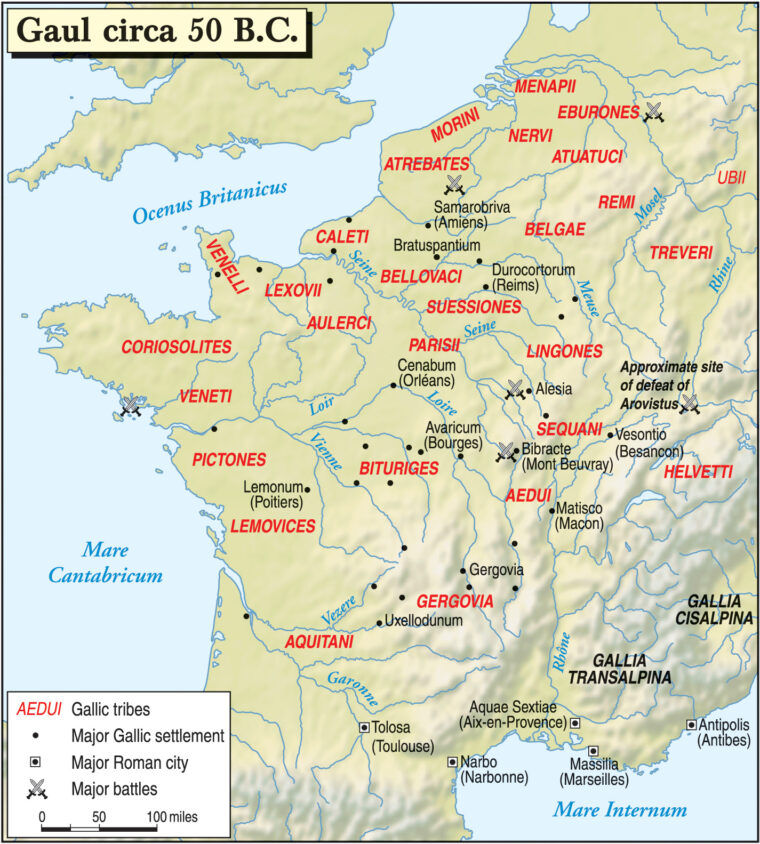
At the time this was pure propaganda, but from a long-term historical perspective it was Caesar who couldn’t have been more right.
Along with the last messages from Ariovistus came news from the Aedui and the Treveri, who dwelt north of the Sequani on the Rhine border. The Aedui complained of the latest violence and looting by the Germanic tribe of Harudes. More alarming was the news from the Treveri that another large Suebi force, under the brothers Nasua and Cimberius, stood ready to cross the Rhine. Caesar knew he had no time to loose and had to engage Ariovistus before the German king met up with the newcomers.
Both sides now pushed toward strategic Vesontio (Besançon), the largest Sequani town. Rich in supplies and surrounded by the Dubis (Doubs) River and a hill, the town was fortified with a wall and a citadel. The stride of the Roman iron-hobnailed sandals ate up four to five miles an hour, as Caesar force-marched his legions and reached the town before the Germans. Once there, he occupied it with a garrison.
While laying in supplies of grain and other provisions at Vesontio, the Roman soldiers learned about their German enemy from the locals. The Germans were said to be of enormous physical stature and of “incredible courage and splendid military training.” The Gauls admitted that the fierce glance of the Germans’ eyes was too much for them to endure. These reports spread alarm through the Roman ranks, from the tribunes, prefects, and fresh recruits to even hardened veterans and centurions. Most came up with urgent excuses to leave the camp. Others stayed out of shame of cowardice but, unable to hide their feelings, swelled up with tears, bewailed their fate, or stayed sulking in their tents. Some hid their real fear of the Germans by blaming their reluctance on the terrain of gullies and forests and the difficulty of ensuring supplies. Commanders confided in Caesar that their troops would panic if ordered to advance!
To revive the dangerously sagging morale, Caesar rallied his centurions and reprimanded them for questioning his orders. Furthermore, he doubted that Ariovistus would break his friendship with the Romans. Even if he did, had not the legions of Marius defeated the Cimbri and Teutones, and had not his own legions been equally victorious against the dreaded Helvetii? If no one followed him then he would go to face Ariovistus with only his favored Tenth Legion. A natural orator, Caesar’s speech humbled the ranks and instilled them with newfound courage to meet the Germans.
Both Leaders Rode Towards Each Other With Just 10 Men
Caesar marched forth from Vesontio and after six days came within 23 miles of Ariovistus’s camp. Ariovistus now agreed to a parley in five days time. Accompanied by a corps of cavalry, he rode toward a knoll that rose midway between the opposing armies. Approaching from the other way was Caesar. He had brought with him not his Gallic cavalry, which he did not trust against the Germans, but infantry from his Tenth Legion mounted on horses. At a distance of 600 yards, both leaders took but 10 men with them and rode toward each other.
Accentuated by his fair complexion, Caesar’s piercing, dark eyes sized up the barbarian warlord. It was clear that like himself, Ariovistus was a natural leader of men. The German king sported a fine corselet of mail and a gilded Gallic bronze helmet decorated with stylized animal motifs. A masterpiece Gallic long sword dangled at his side. To Ariovistus, Caesar looked tall for a Roman and in superb physical condition. He even might have noticed that the Roman leader combed his short hair backward to conceal his premature balding. If Caesar appeared a bit of a vain fob, there was no way Ariovistus mistook him for anything other than the most formidable enemy he had ever faced.
Caesar spoke of the gifts that the Senate had lavished upon Ariovistus. He reiterated Rome’s longstanding friendship with the Aedui and his demands that Ariovistus restore hostages, cease his raids, and bring no more Germans across the Rhine. Ariovistus retorted with his earlier demands, stating that “this part of the country [Gaul] is my province, just as the other part is yours.” He showed a keen knowledge of Roman politics when he took a verbal jab at Caesar, “If I killed you, there are plenty of nobles and politicians in Rome who would thank me for it.” Of course, it was true.
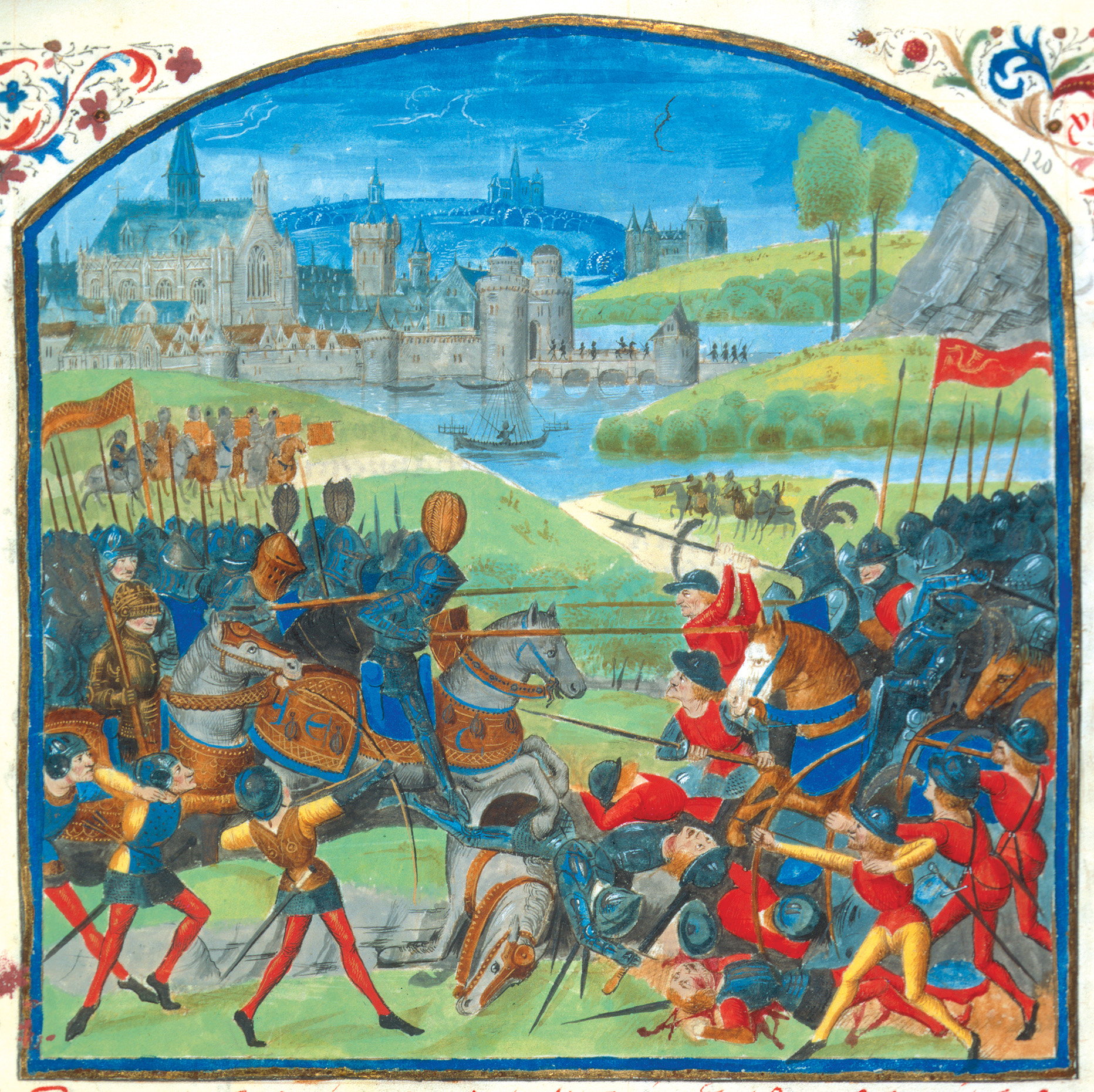
The parley was going nowhere with Ariovistus skirting around the immediate issues in a sort of ritual warrior challenge. He was probably negotiating for time in the hopes that Nasua and Cimberius’s warriors would arrive in time to join the battle. At this point a scout galloped up to Caesar. Ariovistus’s remaining horsemen had been seen riding toward the mount. Overeager, they pelted the Romans with stones and javelins. The skirmish ended the conference, with Caesar and his men leaving the field. The next day more of Ariovistus’s envoys arrived, asking for another meeting between their king and Caesar. In light of the previous day’s events, Caesar prudently declined to go himself. When Ariovistus saw that Caesar had sent some other Romans, he spat, “ What are you coming here for? To play the spy, I suppose?” and promptly threw them in chains.
On the same day, Ariovistus broke camp and marched his army to within six miles north of the Roman encampment. Close by, the Vosges Mountains rose above the two armies. The next day, Ariovsitus’s warriors, wagons, and non-combatants rumbled up and along the lower slopes to circle around the Romans and to camp two miles behind and south of them. From here Ariovistus was in a position to cut the Roman supply road to the Sequani and Aedui. Caesar could see them, of course, and he guessed what Ariovistus was up to, but would not risk engaging the enemy on the hillside. For the next five days, Caesar led his legions out in front of the barbarian wagon barricades, but was unable to entice the Germans into anything more than cavalry scuffles.
The Barbarians Rode Bareback, Thinking it Unmanly to Use a Saddle
With Ariovistus’s infantry refusing battle and the Roman supply situation worsening, Caesar ordered the construction of a secondary camp a thousand yards behind that of the Germans. Caesar wisely drew up two legionary lines to protect the laborers. Ariovistus was not going to let the building go uncontested. The legionaries gritted their teeth and braced themselves as the ground shook beneath the thundering hoofs of the entire German cavalry, some 6,000 strong, sallying forth from their camp. Many of the barbarians rode bareback, thinking it unmanly to use a saddle. At their sides, like mad dogs of war, ran thousands of half-naked footmen, armed with shields and spears and hanging onto horses’ manes to keep up with the advance. Strong arms sent javelins whistling through the air. German warriors leaped from their steeds to do combat on foot. Their mounts obediently remained on the battlefield to carry their masters to safety if needed. In face of the nerve-racking barbarian charge, the Roman lines held firm, and after a skirmish the Germans withdrew.
Caesar now once again aligned his legions for battle, but Ariovistus still refused to be drawn into decisive engagement. However, as soon as Caesar retired to his main camp, Ariovistus launched an assault on the secondary Roman camp to again threaten the Roman supply line. The Germans fought with their usual ferocity, but behind their ditch, earth rampart, and palisade of stakes, the legions proved invincible. When the Germans withdrew at sunset, many limped from serious wounds, leaving behind swaths of their dead comrades at the base of the Roman defenses. The Roman doctors were busy that night, too, though many a soldier, his vitals pierced by a spear or javelin, was beyond help.
The Romans did take some prisoners, and through them Caesar found out why Ariovistus refused a general engagement. To Germans and Romans alike, the supernatural world abounded with spirits and gods. To them it was very real and could only be consulted by individuals skilled in the art. Soothsayers, Germanic priestesses, saw the future in the way streams swirled and by the noises of the water. They took rune-marked twigs and tossed them upon a white cloth. Raising them to the heavens, they cried that if Ariovistus fought before the rising of the full moon, he would go down in defeat!
Advancing Toward the Germans with Upwards of 35,000 Men
The following day, September 10, Caesar left a garrison to hold each fort and drew up his auxiliaries in front of the lesser camp, in full view of the Germans. Caesar claimed he did this to give an impression of strength. Evidently however, he did not trust the auxiliaries to hold their own against the Germans since he did not call upon them even in the critical moments of the coming battle.
With his six legions—around 30,000 to 35,000 men—he advanced in triple line upon the enemy camp. The Germans reluctantly came out to meet him, their wagons drawn up in a semicircle to protect their flanks and rear. As the historian Delbrück pointed out, Caesar does not mention the German cavalry in the ensuing battle because Ariovistus, now on the defensive, had probably dismounted most of them to fight alongside the infantry. His own forces numbered around 20,000 to 30,000 warriors.
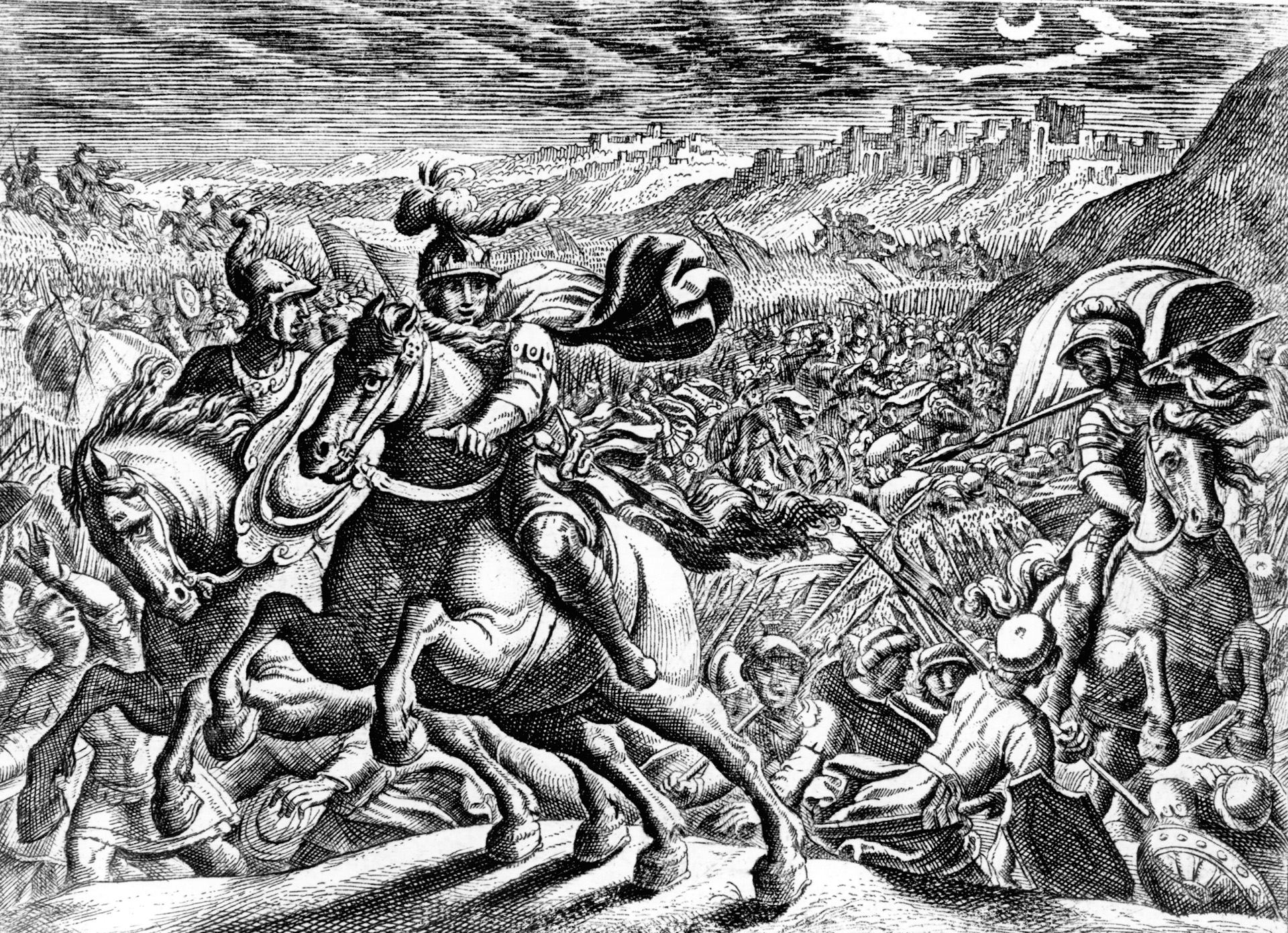
Ariovistus probably decided to give battle because the supply situation had swung to the Romans’ favor and he could not afford to wait until the full moon. By doing so he gave the psychological edge to the Romans. Fears of ill omens gnawed at the German warriors while strengthening their equally superstitious enemy’s confidence in victory.
The German horde arranged itself in rough tribal groups: the Harudes, Marcomanni, Triboces, Vangiones, Nemetes, and Eudussii. Behind them, on the wagon wall, their teary-eyed women stretched out their hands and pleaded for their men to save them and their children from a life of slavery. On the Roman side, Caesar took personal command of the right wing, where the opposing barbarian faction seemed the least steady.
When the blare of horns and trumpeters signaled the advance of the Roman lines, the Germans sprang forward with such swiftness that the legions had no time to discharge their normally devastating javelin barrage. Still, the Roman shield wall bristled with the blades of the gladius, the fearsome Roman infantry sword. The Roman right methodically forced back the weaker German left wing. For a time, though, the German shield wall kept the Romans at bay, as Paulus Orosius relates: “A battle took place, very severe on account of the phalanx of the Germans, which, with their battle line drawn close together and their shields locked over their heads, safe from all sides, they had prepared for breaking the attack of the Roman battle line.”
Their own prophecy nagged at the barbarians’ minds. When, as Caesar described, the legionaries were “brave enough to leap on the masses of the enemy, tear the shields from their hands, and deal a deep wound from above,” the German left wing collapsed in mad flight.
The Fate of Caesar and Ariovistus
On the Roman left wing, however, the barbarians threatened to crush the Roman lines.There, the first two legionary lines were already committed and only barely managed to remain in formation. It was Publius Crassus, commander of the Roman cavalry in the rear, who noticed the dire situation. Publius was none other than the son of Caesar’s fellow triumvir, Licinius Crassus. He galloped up to the third legionary line and personally led it into battle to aid their hard-pressed comrades. The third line turned the tide against the barbarians. They were broken.
The disorderly German mob vainly tried to reach the banks of the Rhine, some 15 miles distant. Those miles were strewn with the bodies of dead Germans, hunted and cut down by the Roman cavalry at their heels, led by Caesar himself. At the river a few of the barbarians managed to commandeer boats. Those not so fortunate boldly dove into the water. Their pumped up adrenaline exerted from them their last ounces of strength. For some it was enough to reach the opposite bank. Others, exhausted or wounded, the river pulled down into its gloomy depths. Ariovistus managed to seize a skiff and reach the other side. Two of his wives died in the rout, as did one of his daughters, while another daughter was captured. According to Plutarch, total German losses were said to have numbered over 80,000, a figure that included tens of thousands of women, children, and the elderly, as well as the bulk of Ariovistus’s strike force.
With the destruction of Ariovistus’s army, the Suebi reinforcements on the east bank of the Rhine vanished into the vastness of the German forests. Other tribes along the Rhine perceived this weakness and, like sharks that turn upon their wounded, attacked the Suebi and killed a great number. The Suebi, however, were far from finished. Tacitus described their confederacy as covering half of Germany. They would continue to haunt Rome for a long time to come.
For the moment, however, Caesar was free to establish Roman hegemony over much of central Gaul. Indeed, to many Gauls, Caesar appeared as an invincible savior. Others thought otherwise, including the formidable Belgae who resented Roman intrusion. In Rome, Caesar’s enemies called him a traitor for making war on Ariovistus, “a friend of Rome.” As for Ariovistus, little is known of him after the battle other than that he died sometime later. In another age he might have carved out a kingdom for himself, but for now it was Caesar’s time to shine.
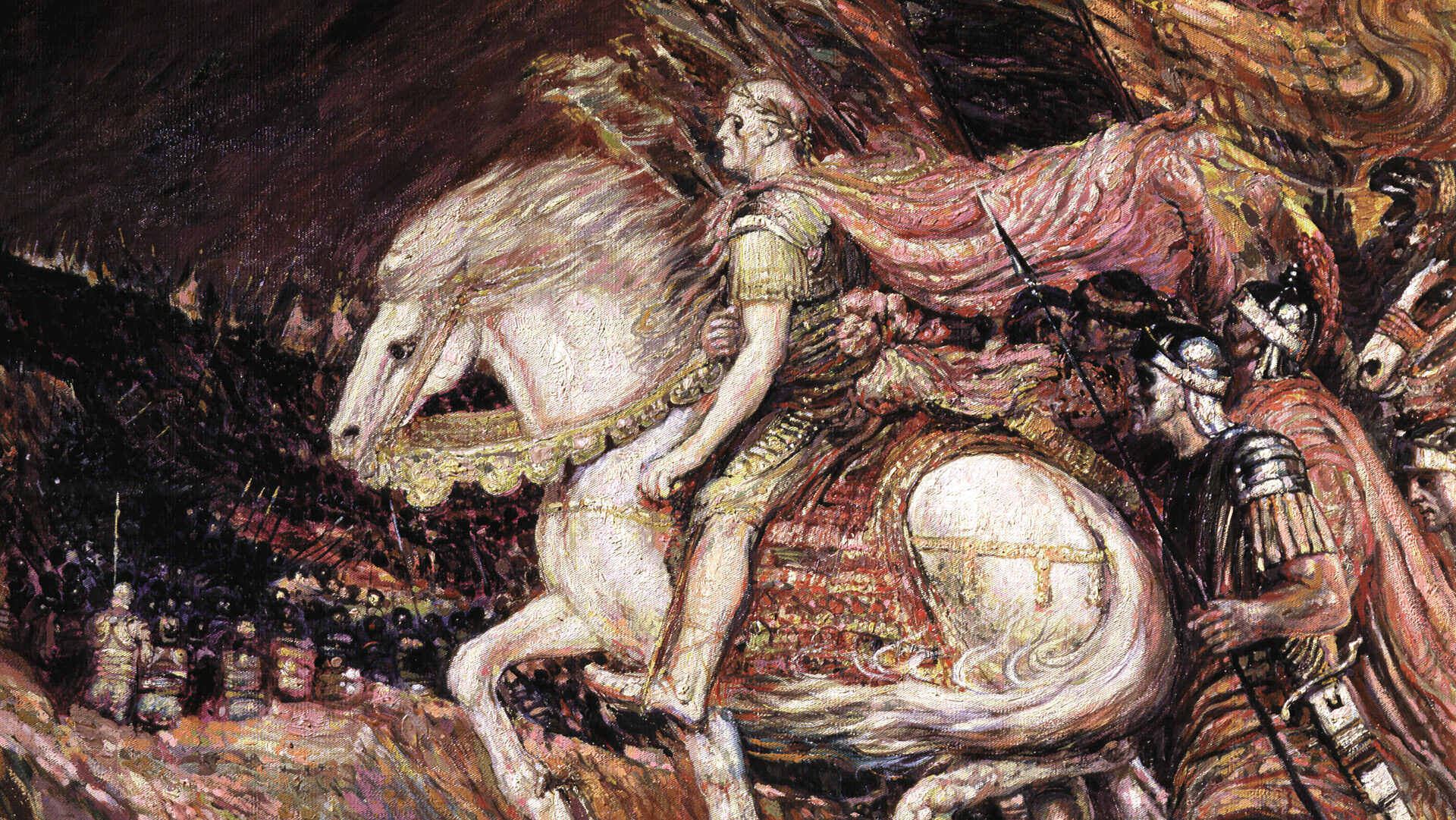

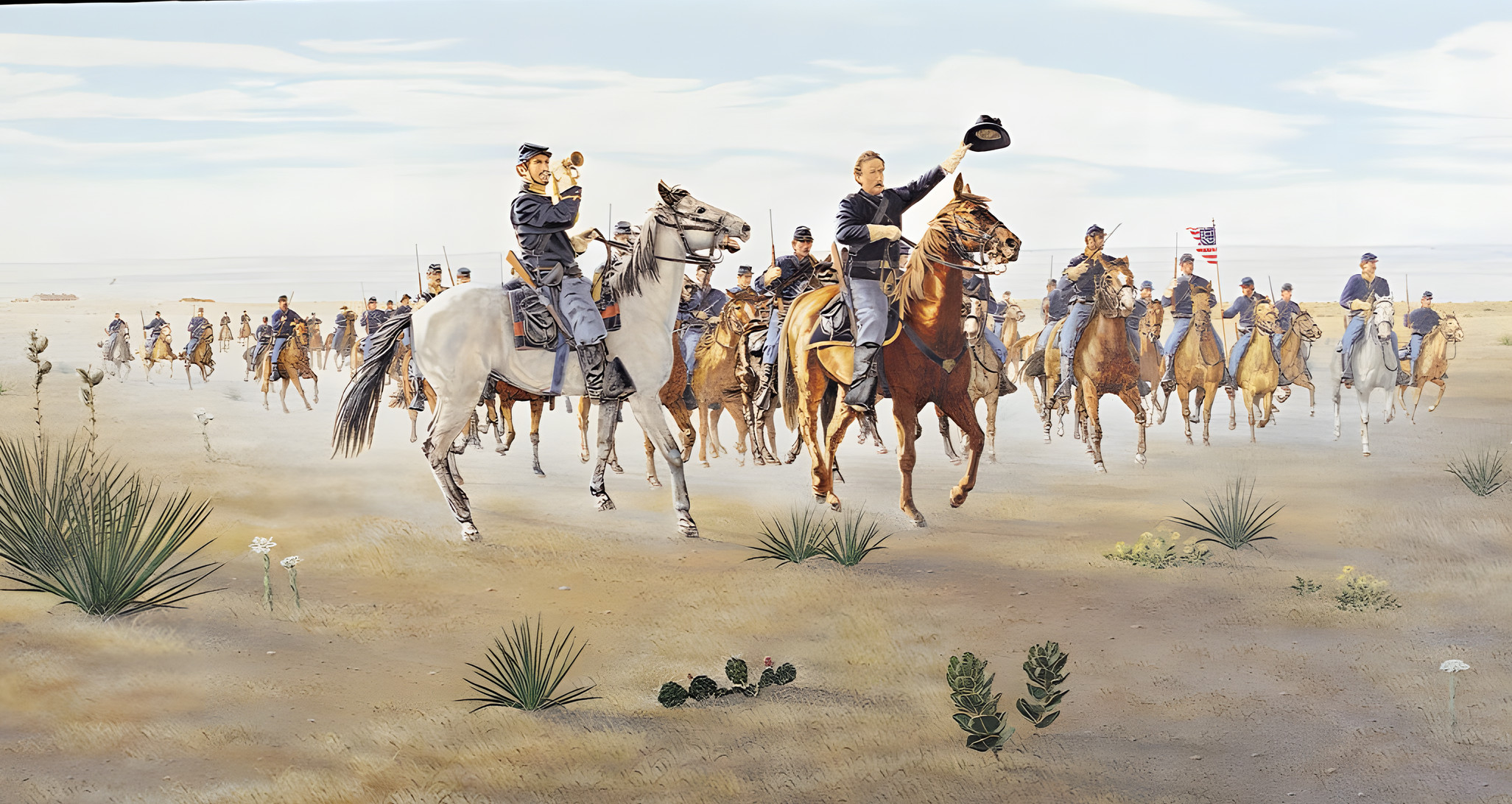
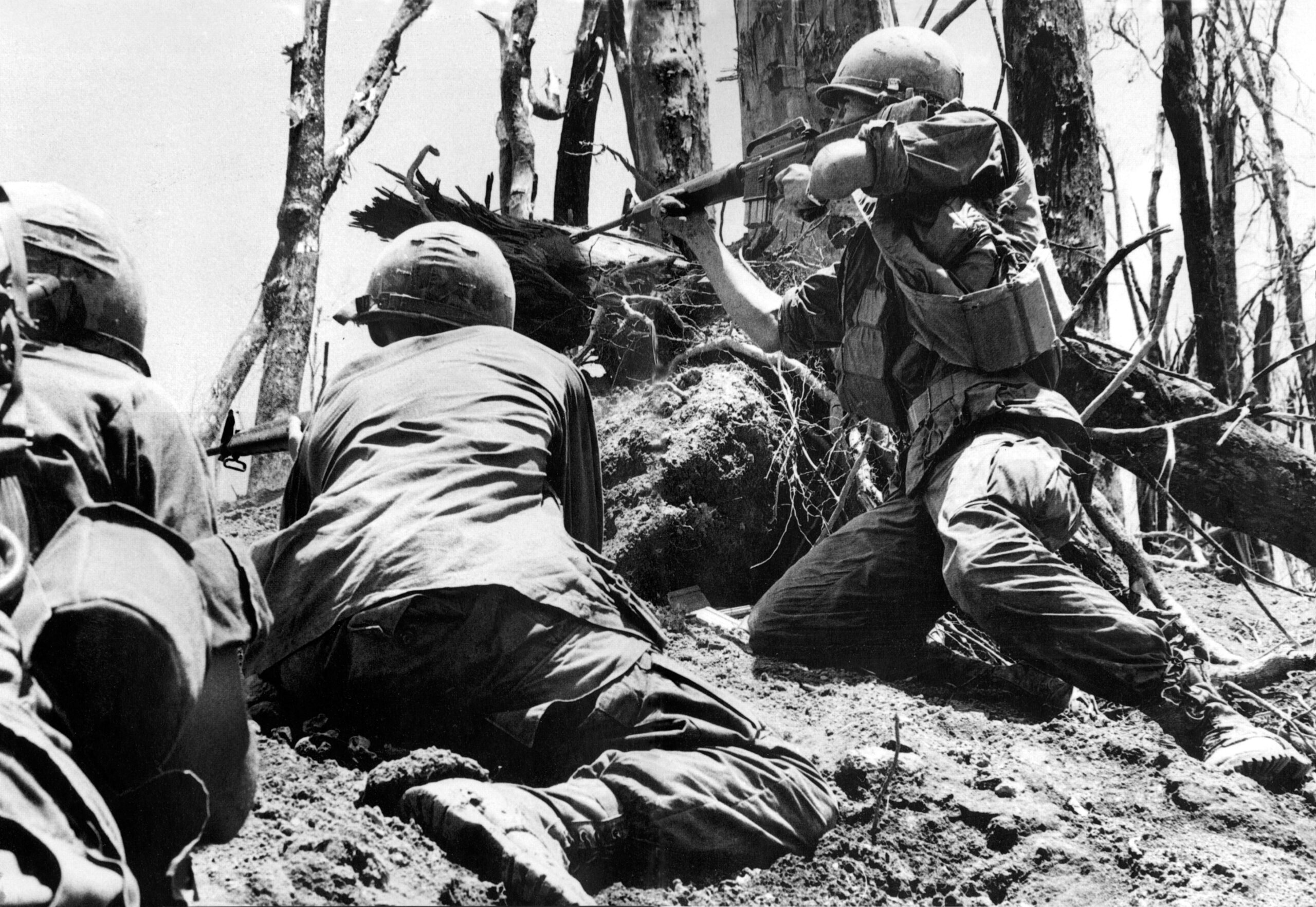
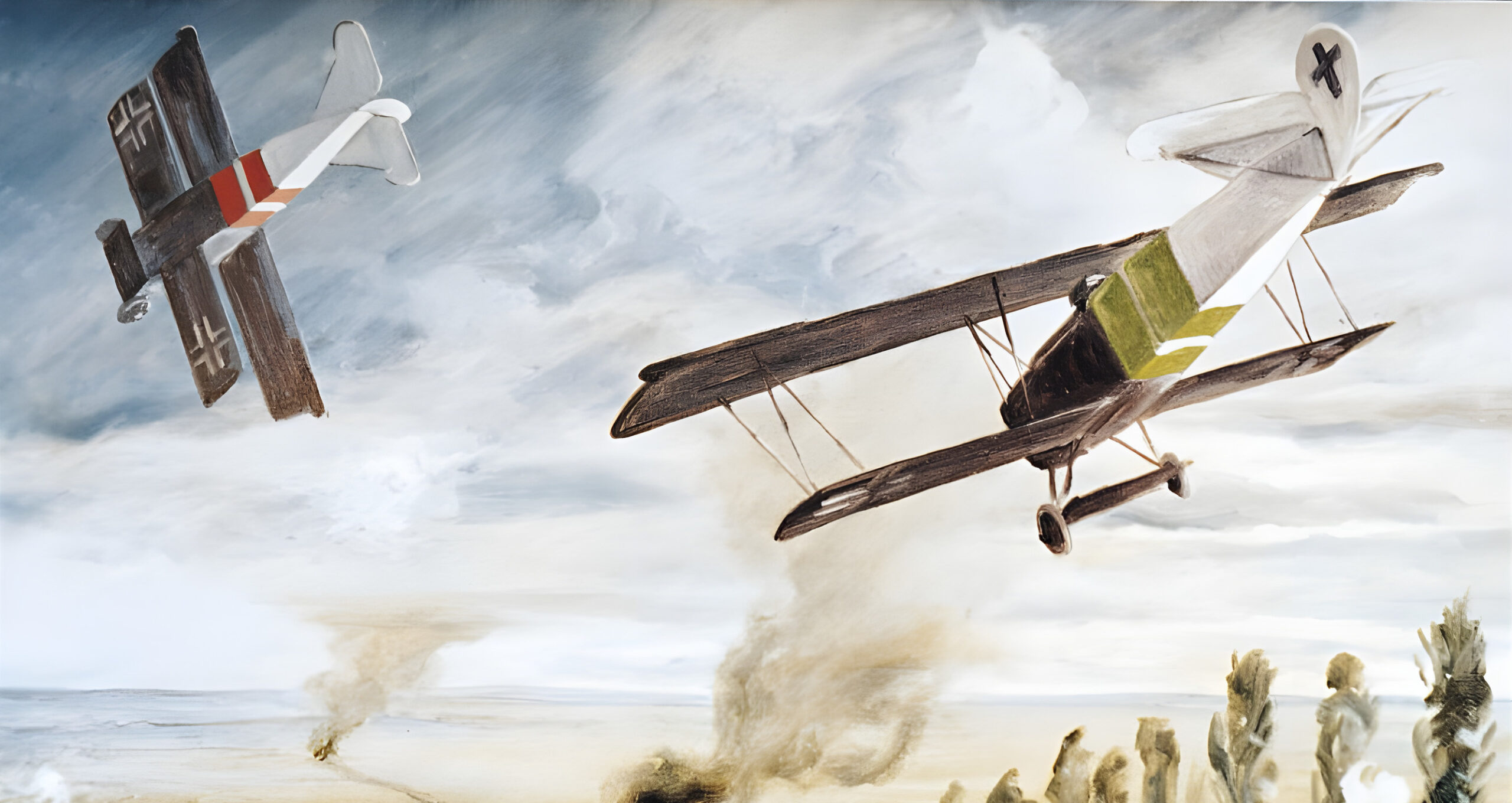
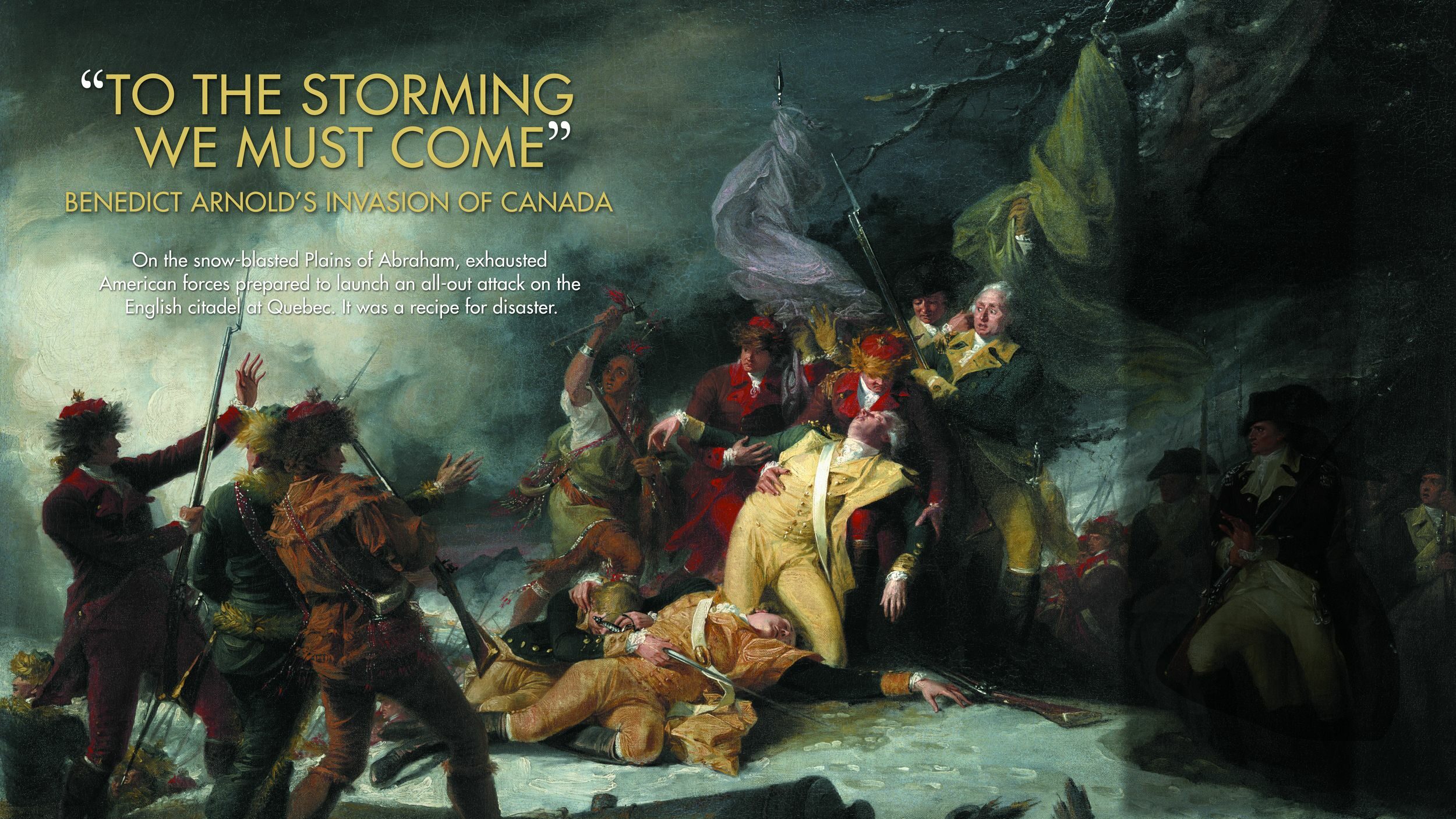
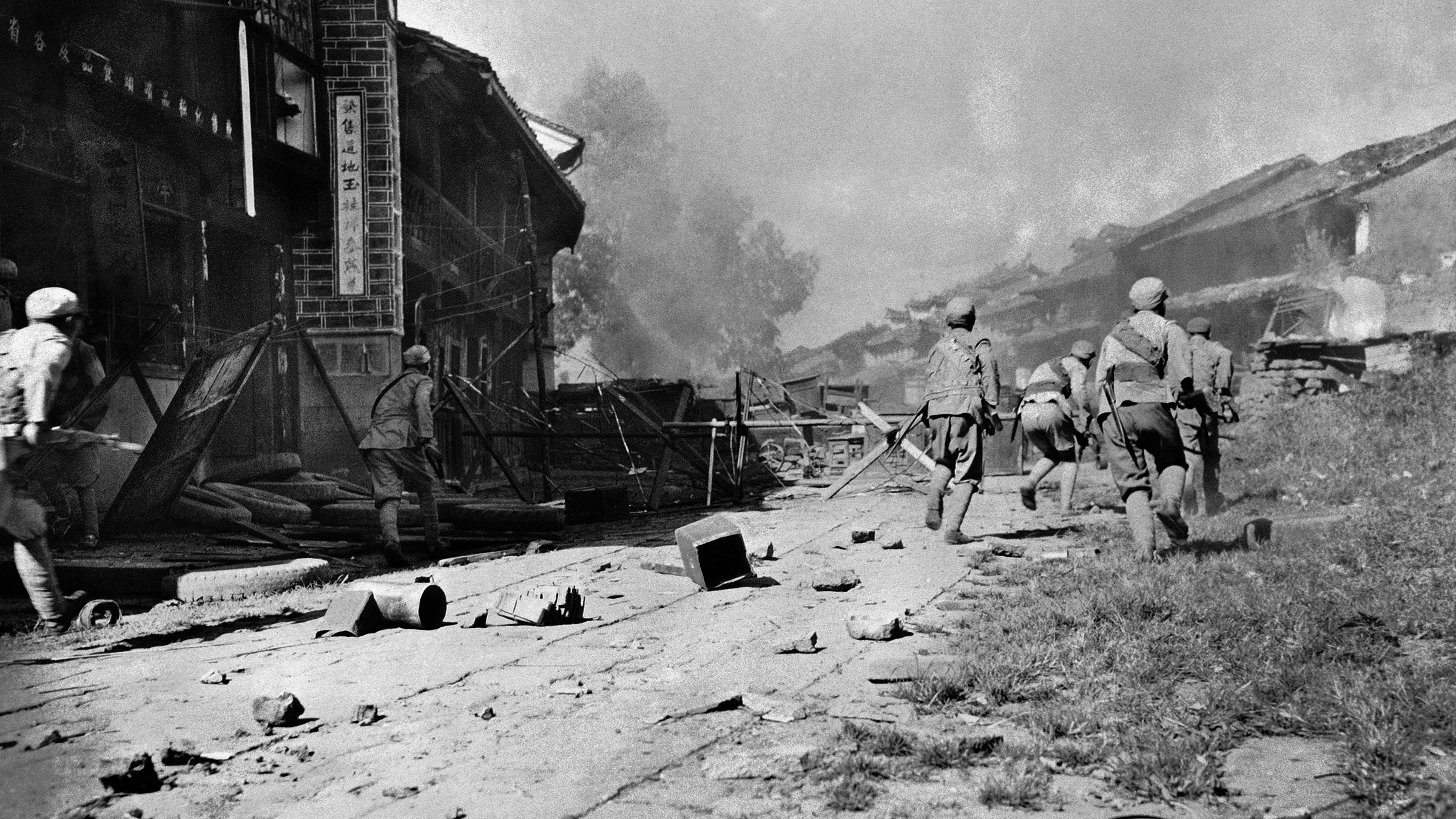

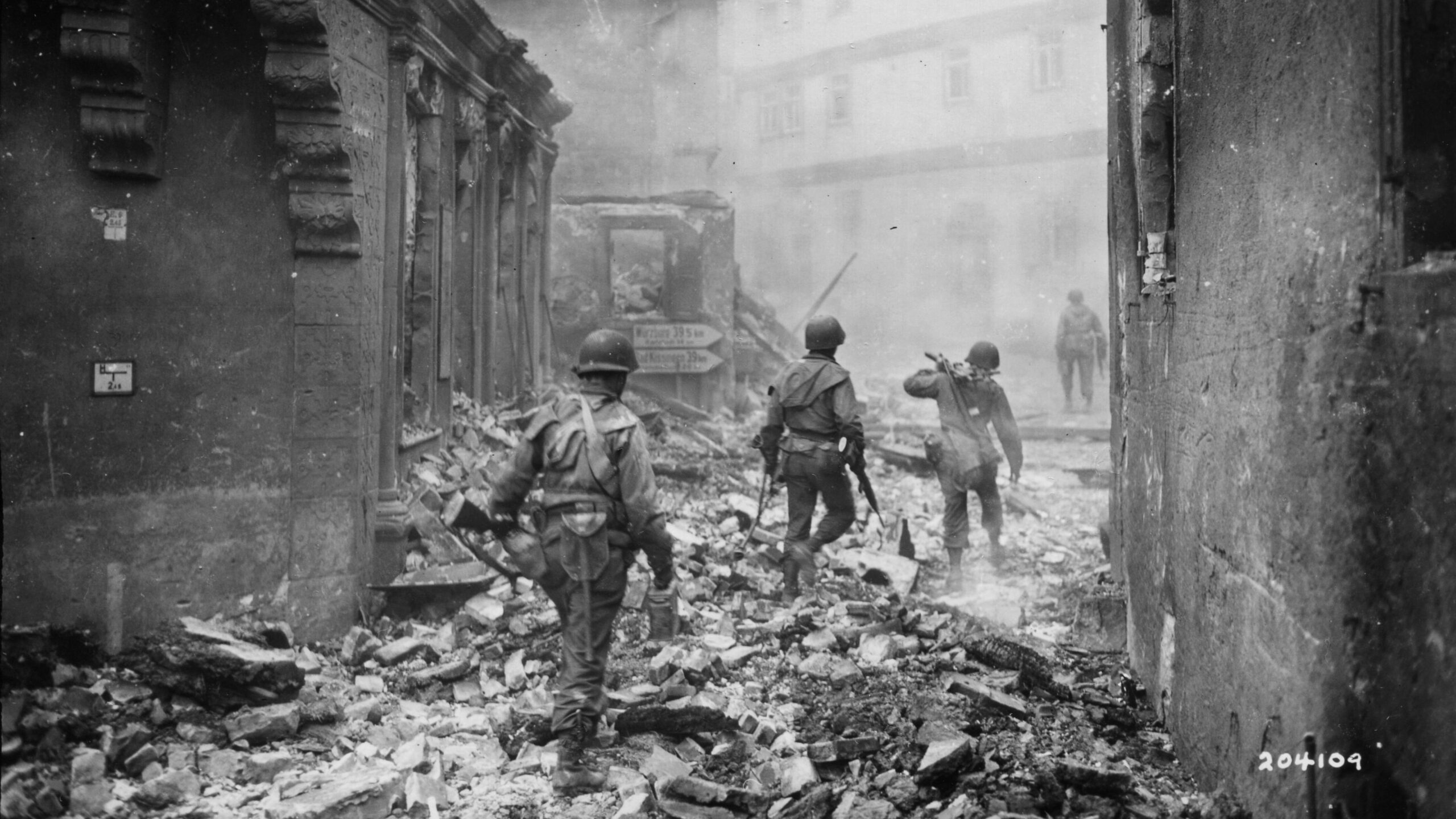
Caesar had grey eyes not dark ones